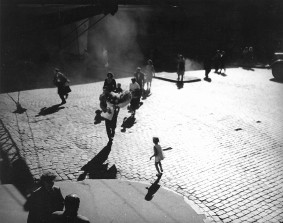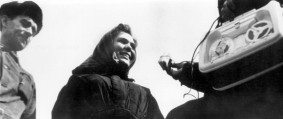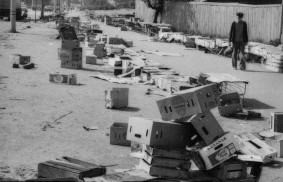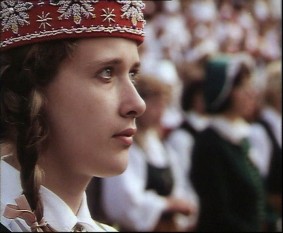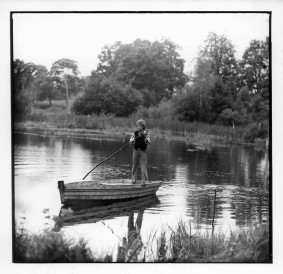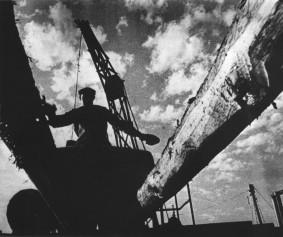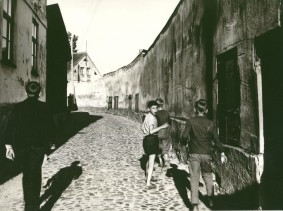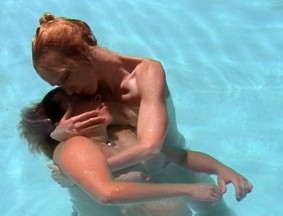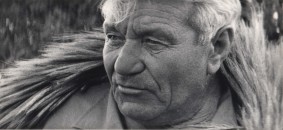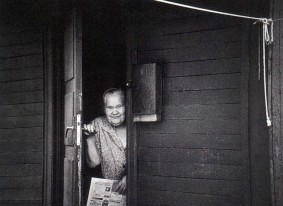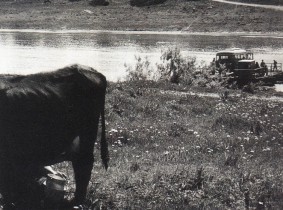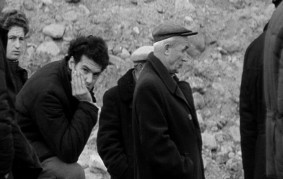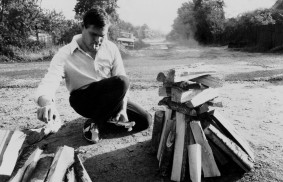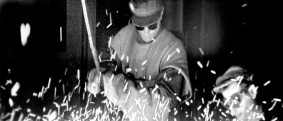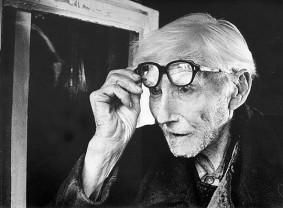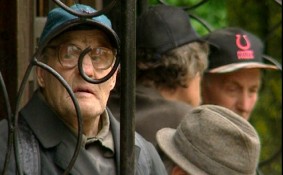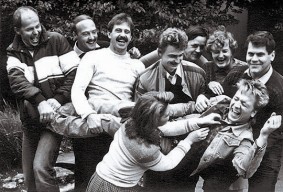-
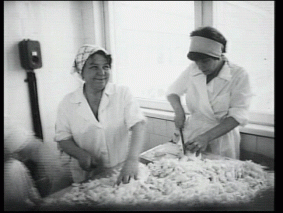
... ja supp on valmis õigel ajal
...And the Soup Is Ready on TimeEstonia 1983 20'
Directed by: Valeeria Anderson
A merry example of life under socialism as told by different characters connected through the daily life of a cafeteria in a large factory. Each day is a constant and arduous struggle: scarce food, defective machinery, poor working conditions. But despite it all, the people are somehow able to maintain their optimism and believe things might get better. A masterpiece of equilibrium and irony, ably built around a wave of shared looks and facial expressions. -
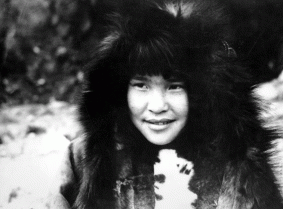
235.000.000
Latvia 1967 108'
Directed by: Uldis Brauns, Biruta Veldre, Laima Žurgina
Capturing a caleidoscope of faces and situations, the film, free of propaganda and the imposition of ideals, revisits the Soviet Union during the 50th anniversary of the October Revolution. A work of extraordinary energy that places side by side the new and the old, the frenzy and the calm, that which is distant and that which is near, thereby unmasking the nature of this enormous country. -
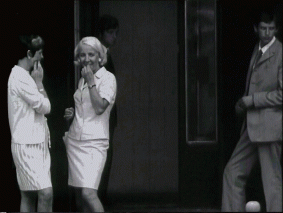
511 paremat fotot Marsist
511 Best Photos of MarsEstonia 1968 14'
Directed by: Andres Sööt
Tallinn in the Sixties. Sööt’s allegorical poem about café life in the Estonian capital draws connections between astronomical texts, the Beatles, the poetry of Artur Alliksaar and the quotidian life of coffee, cigarettes and unruly stares found in the lethargic universe of such public places. A fundamental work and a perfect example, even at a distance of forty years, of a film that depicts reality while injecting elements of subjectivity and adulteration. -
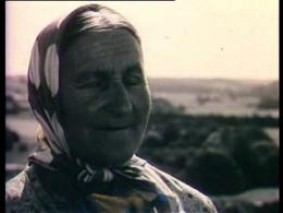
Antigravicija
AntigravitationLithuania 1995 20'
Directed by: Audrius Stonys
An isolated village in the Lithuanian countryside. Seated in her house, an elderly woman recites an old folk story. Then she climbs up the tall ladder that takes her to the rooftop of the church. Through her eyes we see the whole village from up high, immense, that is changing with the changing of the seasons. How does the world appear from such an altitude? -
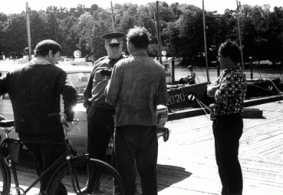
Apolinaras
Lithuania 1973 10'
Directed by: Henrikas Šablevičius
In North Lithuania some of the most beautiful natural reserves in all of Europe can be found. These reserves are rich in forests, beaches and monumental sand dunes. In order for a person to enter into these natural reserves, he or she is obligated to follow a rigid code of regulations. The film documents, at times humorously, the activities of two zealous guardians, who work for the park police, as they carry out their duties. -
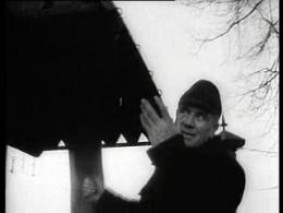
Atverti duris ateinančiam
Open the Door to Him Who ComesLituania 1989 10'
Directed by: Audrius Stonys
A filmmaker encounters a priest who is full of faith and optimism for the future, notwithstanding the hard times of poverty and indifference. The film is completely focused on the observation of affairs and people, of listening to the sounds that help to create another dimension of extraordinary depth. The accounts that father Stanislovas tells join with many images of those who cross the path of the Stonys cinema, and leave a lasting impression. -
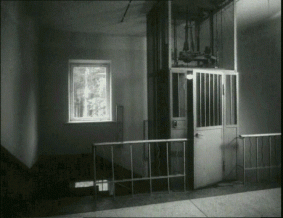
Balss
VoiceLatvia 1986 17'
Directed by: Augusts Sukuts
A man lends his voice to the cinema news during the Soviet era, commenting and explaining the benefits of true socialism for most of his life. He has a nice voice, reassuring and distinguishable from thousands of others. Many years later, after being struck by an aneurysm that constrains him to silence, he learns to speak again. However, the world around him has changed. It is a reflection on the handling of a documentary perspective. -
Baltais zvaniņs
The White BellsLatvia 1961 20'
Directed by: Lettonia
A small child is crossing the heart of the city looking for a bunch of flowers. Produced as a feature film, The White Bells brilliantly documents the fast-growing Rīga of the 1960s, while also reservedly showing the daily rush of its inhabitants. One of the best Latvian documentaries and an excellent example of poetic cinema.
-
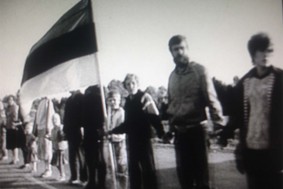
Baltijos kelias
Baltic WayLithuania 1990 10'
Directed by: Audrius Stonys, Arūnas Matelis
The Soviet Empire crumbles. The new Baltic Republics are born. The film originates during the days of great political euphoria that preceed the attainment of independence of Lithuania. The idea was to capture on camera the first breath of freedom of the country: in places, in bodies, in the looks of people enraptured in the exaltation of liberty. -
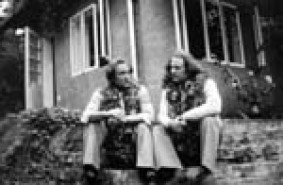
Brali kokari
Brothers KokariLatvia 1978 20'
Directed by: Juris Podnieks
Twin brothers, directors of an orchestra, extraordinary men and great lovers of choral music, take turns in front of the movie camera, creating a split-personality effect that both intrigues and entertains. Thanks to their creative energy and exceptional vitality, they gain a powerful reputation among singers, young and old. Directing a choir of around 10.000 people is their ultimate, supreme challenge. -
Celtne
ConstructionLatvia 1962 10'
Directed by: Uldis Brauns
A film about the building of the Daugavpils synthetic fibre factory executed in an improvisational style, using filmed interviews with the workers. The film emphasizes the worker’s importance in creating the future society and nation, noting that people are more important than the buildings. The poetic voice-over text is viewed as an aesthetic sign of the time. -
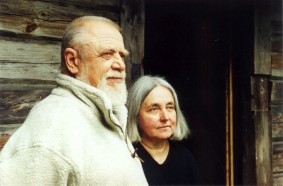
Darbnīca laukos
Workshop in the CountrysideLatvia 2002 18'
Directed by: Olafs Okonovs
Painters Inta and Grube buy a house, named “Mikeleni” in the far district of Vidzeme. Arranging it for the summer studio, they spent long time every year in expeditions around the district, gathering throwen away old traditional equipment of abondoned houses - beds, clocks, different homemade fabrics. The house is an impulse for new colours and motifs in both artists paintings. -
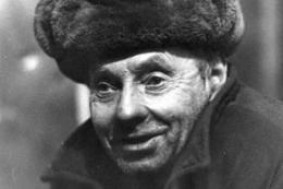
Desmit minuciu pries Ikaro skrydi
Ten Minutes Before the Flight of IcarusLithuania 1990 10'
Directed by: Arunas Matelis
As in the Romas Lileikis's film Sasha, the film speaks about Uzupis, the district in the capital of Lithuania, which is known as “the Montmartre of Vilnius”. The film typifies the atmosphere of decline in that part of the city and reveals beforehand something that is about to take place. Perhaps, a new flight of Icarus. -
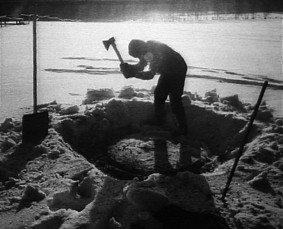
Dolgyy Den
The Long DayLatvia 1981 20'
Directed by: Jevgēņijs Paškēvičs
In showing the daily lives of three rural blacksmiths, the film’s author creates an image of a universal man. Fusing and moulding metal objects is an old and difficult art, not always noticed, but very vital. The film follows three craftsmen at work going back to the old times, when this kind of job was passed on form generation to generation, in a mysterious way. -
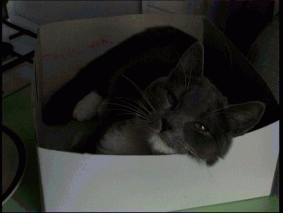
Elav Jõud
A Living ForceEstonia 2003
Directed by: 58
The fight between three men who hold very different views of life. Georg is the archetypal loser, Peeter the intellectual, and Arto the yuppie. All three live in a society centered around success and power, and all three confront and consider it in very different ways. A film about the listlessness, courage, dignity and desperation to be commonly found in different human beings. -
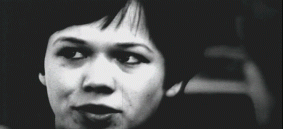
Eldoraado
Estonia 1971 20'
Directed by: Ülo Tambek
A solemn and bleak look at a small city whose economic life revolves completely around its mine. Completely composed of details of faces and hands, this film may have inspired Nick Broomfield when he was shooting Ghosts. -
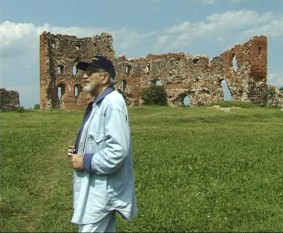
Flashback
Latvia 2002 105'
Directed by: Herz Frank
Arriving at a crucial moment in his life, director Herz Frank, takes a sudden turn towards his past in search of the meaning of life. His retrospective journey takes him across the paths of people that he met in the course of his professional life, as well as his personal life, which he faces with courage and pain. For the most part, comprised of extract footage from his other films, Flashback is a unified piece that reveals a personal perception of the world. -
Gravitācija
GravitationLatvia 1993 10'
Directed by: Dainis Kļava
Beginning from the concept of “gravitation” (the force of attraction of the celestial bodies, metaphorically applied to people and social systems), the film accomplishes a poetic and surreal reflection on the “new world” and how it is configured after the fall of the USSR, highlighting the counterpositions between socialist reality and a free market economy. A unique work marked by captivating music and the editing of Dziga Vertov. -
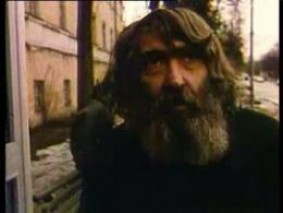
Griuvėsių apaštalas
Apostle of RuinsLithuania 1993 18'
Directed by: Audrius Stonys
Georgian Alexander Oboladze spends all his time wandering through the backstreets of Vilnius in search of things that others have thrown away. His life doesn't change with the changing of the seasons. Not even the snow can keep him from this endeavor. Apostle of Ruins tells the story of his life and speaks about his way of looking at the world and how he confronts his strange, vagabond lifestyle. -
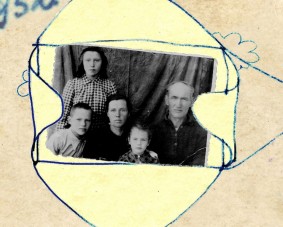
Gyveno senelis ir bobute
Grandmother and GrandfatherLithuania 2007 30'
Directed by: Giedre Beinoriute
This is documentary that uses animation to talk about the lives of the director's grandparents, who were exiled to Siberia by the Soviets in 1948. Using the childlike point of view of a little girl, this difficult time in the history of Lithuania is narrated in a personal way, as in a fairytale. -
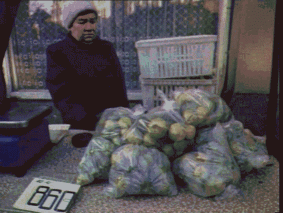
Hobuse Aasta
The Year of the HorseEstonia 1991 49'
Directed by: Andres Sööt
A clinical depiction of the grandiose turn of events in Estonia in 1990. The Soviet Union has just fallen and the new Estonian republic is fighting a mass of legal, moral and social questions. It’s not easy to gain independence, and Sööt’s camera follows the citizens of Estonia through several situations, with eyes wide open that hint at a belief in something larger and essential to confront financial turmoil and ideological chaos. -
Homeland
Latvia 1990 72'
Directed by: Juris Podnieks
Choral music is the most prominent, cultural phenomenon of the Baltic Republics. It might be one of the only things that will find to be unaltered in Lithuania, Latvia and Estonia. For years, during the Soviet occupation, choral music was the expression of their national identity and a means of rebellion against their oppressors. Bringing together distant images from the past of great poliphonic concerts, the films pays homage to all of those who fought for the political independence of the Baltic people. -
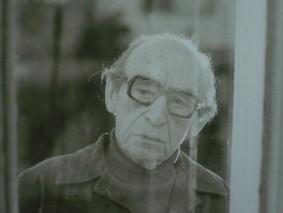
Iliuzijos
IllusionsLithuania 1993 19'
Directed by: Diana Matuzevičienė, Kornelijus Matuzevičius
Un ritratto poetico della vita, pubblica e privata, dello scrittore ebreo lituano Jokūbas Josadė ormai in età avanzata. “La mia patria è qui dentro. Una scatola chiusa che nessuno può aprire nè scalfire”, dice dal suo studio pieno di libri, raccontando i drammatici eventi che hanno scalfito la sua vita. Un destino che riflette quello della cultura ebraica lituana, ormai scomparsa.
-
Imants Ziedonis. Portrets locījumos
Imants Ziedonis. A Portrait in CasesLatvia 1979 20'
Directed by: Laima Žurgina
Following the letters of the alphabet, one of the Latvia’s favourite poets and writers, who also wrote the film’s script together with the director, depicts his world, his family and friends, his beloved woman. The artist reveals his personality not only through poetry and visuals, but also through his stories of people, places and nature. -
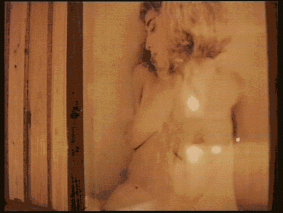
In paradisum
Estonia 1993 53'
Directed by: Sulev Keedus
The life of Pille, Andreas’ wife, imprisoned for multiple homicide. Filmed in the style of cinéma vérité, it is a rare look into the Estonian penal system and, at the same time, the story of a woman who has suffered violent abuse at the hands of her husband. -
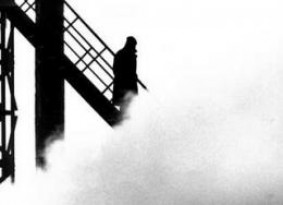
Is dar nebaigtu Jeruzales pasaku
From Unfinished Tales of JerusalemLithuania 1996 26'
Directed by: Arūnas Matelis
Strange men in uniform arrive in a Lithuanian village that is partially flooded. They are workers, who conduct themselves toward their factory. Still more bizarre characters accompanied by their solidiers are following Christ. They are men dressed as angels that recall to us the tradition of ancient ceremonies.
-
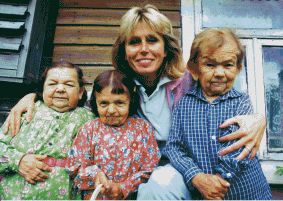
Iš elfų gyvenimo
From the Life of ElvesLithuania 1996 25'
Directed by: Janina Lapinskaitė
Leonora Čepulienė is 78 years old. She lives with her husband's dwarf children, whom she continues to care for evern after his death. Thanks to her help, these children have now become adults. The film gently follows the story of its protagonists, as it focuses on their faces, observes their gestures, their looks, their moments of embarrassment, the scenes from their every day lives. -
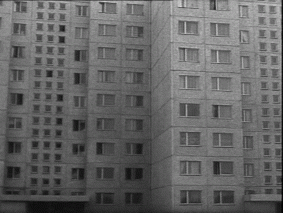
Jaanipäev
Estonia 1978 62'
Directed by: Andres Sööt
The story of the cultural celebrations one midsummer’s night in a neighborhood in Tallinn. Drunks, kids, men, women, vendors, state officials, housewives, foreigners… everyone is watched and viewed with an eye that is compassionate towards and enchanted by all manifestations and manners of human beings. Instants, from the center to the suburbs, of a sweet and hectic urban symphony. Portraits of ordinary events that take on an intimate nature. -
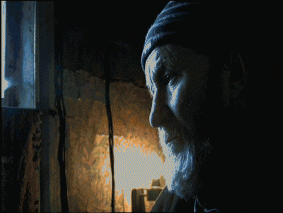
Jonathan Austraaliast
Jonathan from AustraliaEstonia 2007 89'
Directed by: Sulev Keedus
An harbour is built on Saaremaa island. Fireworks and cheers greet the arrival of the ship Lili Marleen. Marriage rituals are performed for tourists in Mustjala, the district closest to the marina. Jüri, Eti, Leo, Feliks and Toomas have “gone” European. Will the legend of the white ship carrying everyone to the land of dreams become a reality? -
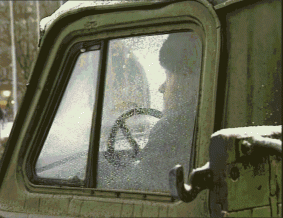
Jõulud Leninita
Christmas without LeninEstonia 1994 58'
Directed by: Andres Sööt
The statue of Lenin was knocked off its pedestal in the city of Narva to be stored elsewhere, in a little known, far corner of the world. The event elicited different reactions from the population. The people of Narva see the removal of Lenin’s statue as a palpable symbol of the change of power, and react strongly as a consequence. If such violent reactions cover up fear and insecurity, what will happen next time? -
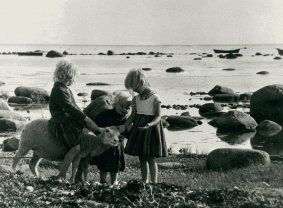
Kihnu naine
Kihnu WomanEstonia 1973 50'
Directed by: Mark Soosaar
A film about women living in a small community on the island of Kihnu in Estonia. Their lives and activities over the seasons. Child birth. Work at their looms, in the fields, alongside animals in the city. And the lives of other people in the community, the rituals at the beach, love and marriage, games among the rocks and school life… -
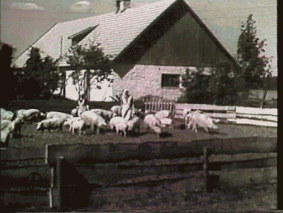
Kohloosis Uus elu
In the Collective Farm “New Life”Estonia 1951 9'
Directed by: Vladimir Parvel
Soviet propaganda newsreels about what was considered one of the most active kolkhoz in Estonia, known as New Life. The film relies on every familiar propaganda trope, lingering over new scientific discoveries aiding agricultural progress and not failing to describe the important and exciting moments when homes were built to house the incoming kolkhoz «guests». -
Krasts
The CoastLatvia 1963 22'
Directed by: Aivars Freimanis
Fishermen’s life in a Latvian sea-side village. For centuries these maritime dwellers have gone out to sea in wooden boats, repairing nets and hauling heavy catches by hand. In the 1960s, a new, technical era enters into this unhurried idyll. The author documents the changes to the old way of life in a delicate and unobtrusive way, showing them from the viewpoint of the simple folk. -
Kuldīgas freskas
The Frescoes of KuldigaLatvia 1966 50'
Directed by: Aivars Freimanis
Water falls, princes and princesses, brides and jazz musicians, new mothers and grey-haired ladies in a sunny, care-free summer in the 1960s: composed of several little stories which are like cinematographic paintings, the film shows the fundamentals of human life, but also the unusual environment in the small town of Kuldīga, all portrayed in a refined, heart-warming film shot in the poetic documentary cinema style. -
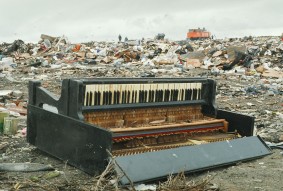
Leiputrija
DreamlandLatvia/Germany 2004 35'
Directed by: Laila Pakalnina
There are places that we don’t want to know anything about; one such place is a dumpsite. From the humans’ point of view, it is a ghastly place, a stinking desert of trash. But it’s a desert that is teaming with life: the astounding profusion of insects, reptiles, birds and mammals, all intertwined in an existential life-death relationship imparts to it with some strangely alluring dream-like quality. -
Lengvas raganavimas
Mild WitchcraftLithuania 2004 25'
Directed by: Inesa Kurklietytė
From the Crimea to California, Jurga Švedienė, the spiritual Lithuanian midwife, has helped almost 450 newborns come into the world through the medium of water. The director fixes his gaze on the women who choose this “primitive” way to give birth, asking them questions about the trauma of birth, but also the idea that every birth is, in fact, the beginning of a journey through the marvels of this world. -
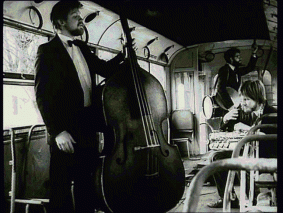
Levitācija
LevitationLatvia 1991 10'
Directed by: Dainis Kļava
Up to the beginning of the Ninties Latvia kept in producing a showreel, made of short documentaries, in order to be released in television or in the cinema halls. Using avant-garde stylistics, Levitation, one of the last examples of these “chronicles”, shows the inhabitants of the capital of newly-independent Latvia, their hopes for the future and the elation. They ride trams, but dream of flying. -
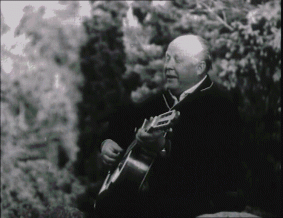
Meie Artur
Our ArthurEstonia 1968 55'
Directed by: Grigori Kromanov
The biographical portrait of one of the most legendary Estonian singers, Artur Rinne. Man of a thousand faces, Rinne was exiled to a Soviet work camp in Siberia and, upon returning, garnered fame and enormous popularity among the people for his vocal gifts. The film is a thoughtful, engaging look at the world of an artist coming to terms with himself, his people and his country. -
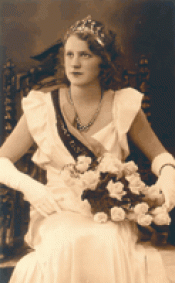
Miss Saaremaa
Estonia 1989 50'
Directed by: Mark Soosaar
Portrait of Ljuba Hermann, who in 1931 earned the title Miss Saaremaa, the largest island in Estonia. Now an elderly woman in her house in the country, she remembers the fundamental moments of her life in this film that is also, simultaneously, the portrait of Estonia’s history in the course of the 20th Century, filtered through the eyes of such a vivid character, whose words cut deep, despite the fact that she is in the twilight of her years. -
Mūžs
A LifeLatvia 1972 20'
Directed by: Herz Frank
During private collectivization and deportation in Siberia during the 1945-53 period, Edgars Kauliņš, chairman of a kolkhoz saved many peasants by building up a collective farm with their help. This film differs from other documentaries of that time with a deeper sense of period change, the ability to read the soul’s emotion in the character’s faces. -
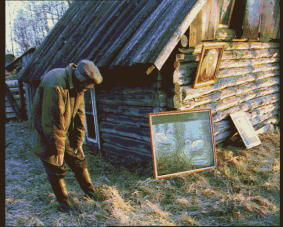
Naivie
The NaïvistsLatvia 1992 50'
Directed by: Dainis Kļava
An aging painter speaks about his methods and the times of his paintings. The places, the bodies and the fantasies first come to life in front the movie camera and then on the canvas. They are fantantic images, full of vibrant colors, which have an almost child-like quality. The critics call them «naïf». However, they communicate powerful emotions, which relate to life. -
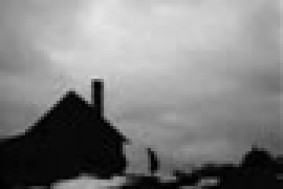
Neregiu zemé
Earth of BlindLithuania 1992 24'
Directed by: Audrius Stonys
The film springs from at least three ideas connected to each other in an irrational way: the story of a cow being taken to the butcher, the description of simple pleasures, how to ascend to the top of a hill and descend in a wheelbarrow, and the portraiture of a several blind people. The great, big eyes of the cows are seen in contrast to the unseeing eyes of the blind people. -
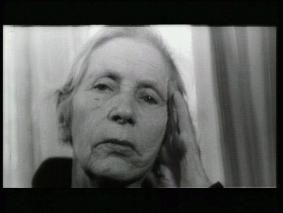
Olen valmis, ma lahen
I’m Ready I’m GoingEstonia 1967 27'
Directed by: Semjon Shkolnikov
A film about Boris Vilde, a man who, among other things, introduced the French word “resistance” to Estonian langauge. Vilde was a fighter and an idealist, but the portrait made by director Semjon Shkolnikov reveals new facets and strange analogies with a rapid and allusive eye. -
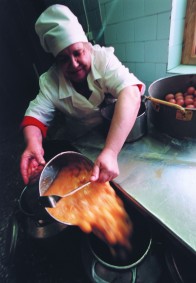
Olu Kundze
Egg LadyLatvia 2000 30'
Directed by: Una Celma
Aina - the Egg Lady of the title - breaks eggs up to 20 000 by hand all day for a Latvian bakery company. To an outside observer, the job appears meaningless when most similar enterprises can afford to automate such tasks. But Aina says her work brings her fulfillment. The portrait of a woman’s life, her dreams, illusions and sadness while the time goes by in an ending era. -
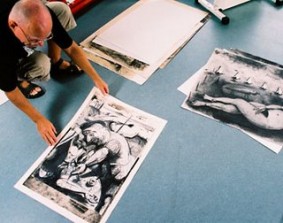
Pärnography - Mees animatsoonist
Pärnography - The Man from AnimazoneEstonia 2005 52'
Directed by: Hardi Volmer
A tribute to the tradition of animated films that focuses its attention on Priit Pärn in particular. Born in 1946, Pärn has directed animated films that have received international honors and awards. His films are grotesque, absurdist and enjoyable, full of allusions and traces of subtle social critique. -
Pasts
The MailLatvia 1995 20'
Directed by: Laila Pakalnina
The day starts when the mail arrives. It's a custom. The film places its focus on the habitual actions of every day life. It starts with the arrival of the truck and continues with the separation of the letters, which will be delivered house by house. “If there actually exists something predefined in life, it is the delivery of the mail.” (L.P.) -
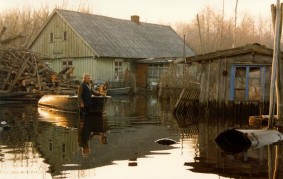
Pavasaris
SpringLithuania 1997 20'
Directed by: Valdas Navasaitis
Spring arrives in the lands of the North. The snow melts and the rain comes. The water floods the fields and the streets. Men and animals go around in boats. The film is a portraiture of an old farmer at work doing his daily chores in an area that is completely flooded. The situation is catastrophic, but for the man it is only one of the many floods he has experienced in his life. -
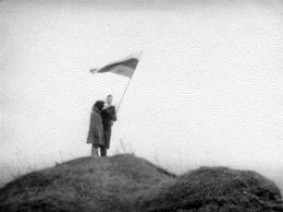
Pelesos milzinai
Giants of PelesaLithuania 1989 10'
Directed by: Arūnas Matelis
The film, the director’s thesis, depicts the daily life of Pelesa, a Lithuanian village in Byelorussian territory. Of the various characters living there, Matelis focuses on Marija Kruopine, famed for being «illuminated». “Films aren’t just work for me. By opening up to them I become a part of them and this attitude is the best means of understanding them and myself.” -
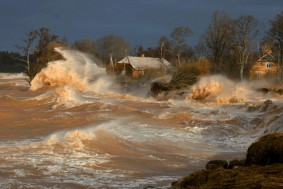
Piejūra
Sea of AttractionsLatvia 2005 26'
Directed by: Dainis Kļava
The narrow strip of seashore is a no man’s zone belonging both to the sea and the earth. Nevertheless this zone exerts almost a magnetic attraction on people. Due to its strange attractive force, the seashore often turns into a playground for all sorts of people. Behind the director‘s documentaristic apparently cold look, the film presents an ironic view of one such place on the Baltic Sea coast. -
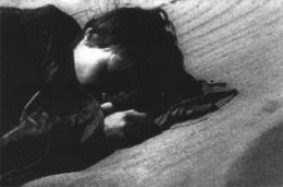
Pirmasis atsisveikinimas su rojum
The First Farewell to ParadiseLithuania 1998 15'
Directed by: Arūnas Matelis
A Bohemian man sits in an indefinite place, on a street corner, drinking, singing and cursing. He hears the noise of a train in the distance. On a sunny terrace, another man sits at a table. The film, that is like a study of the depth of sound, sets about communicating the stupidity and beauty of everyday life. -
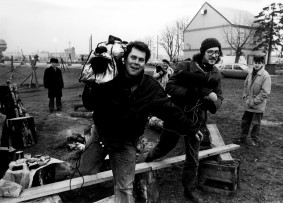
Postscriptum
Latvia 1988 30'
Directed by: Juris Podnieks
Usually shown together with the film Homeland, which celebrates the pride of the national resistence, Postscriptum immortalizes the tragic events that took place in Vilnius and in Riga in January 1991, when the Soviet troops fiercely intervened against the declaration of independence. Two cameramen, Andris Slapins e Gvido Zvaigne, were killed while filming the events. -
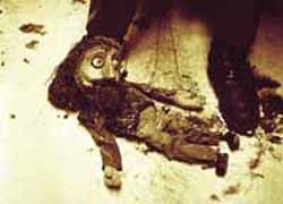
Praejusios dienos atminimui
In Memory of the Day Passed ByLithuania 1990 40'
Directed by: Šarūnas Bartas
The film is a day in the life that passes by, even if it seems neverending. In the morning the streets are alive with people, pedestrians and cars, with loud and exultant noise. Such sounds accompany the restless walk of a woman and her child across a dusty street, while Bartas’ gaze wanders through many different perspectives. -
Pramis
The FerryLatvia 1994 16'
Directed by: Laila Pakalnina
A ferry crosses the river. The work of the ferry is never-ending. It is a boat that transports people from one shore to another, from one country to another country, without ever stopping, regardless of the changing seasons. It is a brief portrayal of Piedruja-Druja, on the border of Latvia and Belarus, at the beginning of the 1990s, when the Soviet Union began to crumble and Latvia gained its independence. -
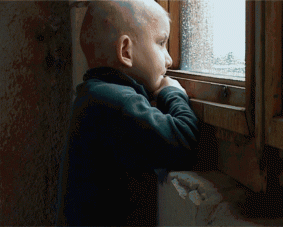
Prieš parskrendant į Žemę
Before Flying Back to the EarthLithuania 2005 52'
Directed by: Arūnas Matelis
The film tells the story of a few children with leukemia, recovering in Vilnius Pediatric Hospital where the daughter of the director fought the disease for months before remission. A poetic documentary about the tenacity of the human spirit, the film uncovers their pain and hope amid an indifferent world. -
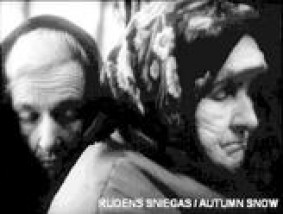
Rudens sniegas
Autumn SnowLithuania 1992 16'
Directed by: Valdas Navasaitis
The arrival of the first fall snow coincides with the last moments of a man’s life on earth. Navasaitis’ films are steeped in silence. His camera neither alludes nor underlines. Like a mute witness, he captures the life taking place before him. And he makes of it a poetry of the spirit.
-
Sākums
BeginningLatvia 1961 10'
Directed by: Uldis Brauns
The film documents the building of the first phase of a dam on the river Daugava. Fragments of the labour process are precisely edited creating a poetic praising of labour which, in the manner of Soviet positivity, expresses the greatness of man and the building of a new, future world, where each worker has an important place. -
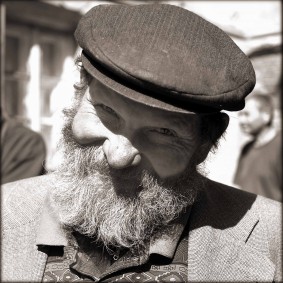
Saša
SashaLithuania 2006 42'
Directed by: Romas Lileikis
The painful, dramatic years of transformation in Užupis, a small corner of Vilnius known around the world as «The last bastion of Romanticism». The film depicts the slow disappearance of a neighborhood loved by poets, artists and photographers, revealing the now doomed old houses and the triumphant modern residencies.
-
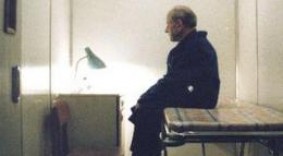
Sekmadienis. Evangelica pagal liftininka Alberta
Sunday Gospel According to the Lift-man AlbertasLithuania 2003 18'
Directed by: Arūnas Matelis
Albertas, a lift-operator, sits all day waiting for someone to ring the elevator. His wait transcends his sense of community and symbolism, a sign that someone needs him. The film, rife with surreal humor, is the documentary version of Samuel Beckett’s Waiting for Godot. -
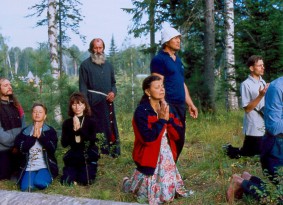
Sekotāji
The FollowersLatvia 1988 10'
Directed by: Andis Miziss
What pushes thousands of people to tear down the bridges of the past and venture out into the wild, Siberian taiga, following after Visarion, an ex-agent of the Soviet police who proclaims to be Jesus? The film tries to answer this question, showing the construction of the New Jerusalem, a resettlement «destined» to become the birthplace of a new civilization after the coming imminent apocalypse takes place. -
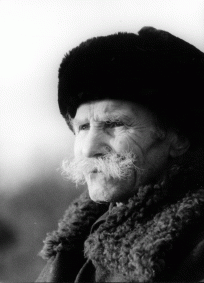
Senis ir žemė
Old Man and the SoilLithuania 1965 18'
Directed by: Robertas Verba
The film is the poetic depiction of an agriculturalist who lives in harmony with nature. The Trimonis family, who have always lived in the country, recount the salient moments of their lives, explaining the sacrifices they have made for their children. In the end, the camera turns its gaze on the mother’s gravestone, who was present during filming. -
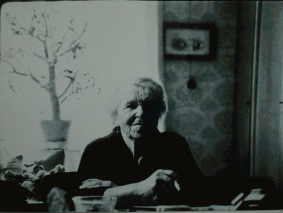
Šičionykštė
A LocalLithuania 2001 26'
Directed by: Diana Matuzevičienė, Kornelijus Matuzevičius
The portrait of a woman whose silence betrays more than her words. Her life passes before our eyes: from deportation to Siberia, that uprooted her, to the pains suffered in work camps. Now, returned to the place she has decided to call home, she defends her choice and her right to happiness. -
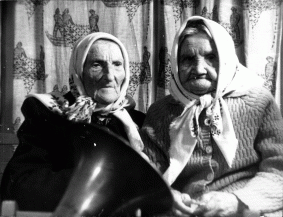
Šimtamečių godos
Thoughts of One Hundred Years OldLithuania 1969 17'
Directed by: Robertas Verba
Men and women who have hit one hundred years old remember moments of their lives. Their stories are often tinged with pain and regret, as well as moments of joy and wonder. All talk and listen, but none knows how to go back to his or her age. -
Skersiela
Crossroad StreetLatvia 1988 85'
Directed by: Ivars Seleckis
Latvia, 1988. The film camera captures the daily lives of a small community in a suburb of Riga, during a time when the fight for independence had just begun. The destinies and the thoughts of the common people who live in that street form the portraiture of a type of model society by revealing the ethics and the politics of a system already coming to an end. -
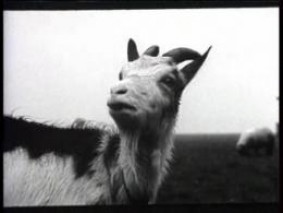
Skrajojimai melynam lauke
Flying over the Blue FieldLithuania 1996 20'
Directed by: Audrius Stonys
A man sits alone in a plane built at home, and keeps his balance between life and death. During his flight, immense landscapes pass by, half-deserted streets. Silence and waiting are all around. A film about solitude in the endless sky. Part poetry, silence and meditation. -
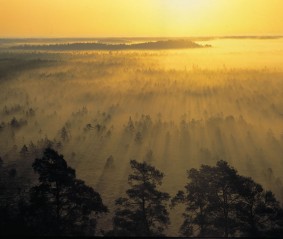
Skrydis per lietuva arba 510 sekundziu tylos
Flight over Lithuania or 510 Seconds of SilenceLithuania 2000 8'
Directed by: Audrius Stonys, Arunas Matelis
A poetic documentary carries us to the tops of trees, to the rooftops and countryside of Lithuania, including the dunes of Nid and the beautiful old city of Vilnius. How can a film be based around sound and images? Matelis and Stonys succeed in depicting the wind in images colored by time and movement. -
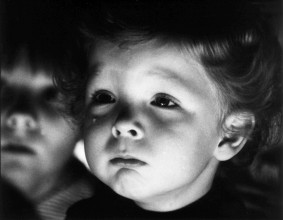
Starshe na 10 minut
10 Minutes OlderLatvia 1978 10'
Directed by: Herz Frank
In 1978, while observing a street of Riga in search of images for a news film, Herz Frank and his assistant, Andris Slapins, encounter a group of children gathered in front of a puppet theatre. The filmmaker and his assistant exchange looks with those young viewers, and those looks are immortalized forever. In 10 minutes, the first sentimental training of life. -
Strādnieks
WorkerLatvia 1963 11'
Directed by: Uldis Brauns
Typical of the poetic documentary style of the early 1960s, this film is a hymn to the workers who participated in the industrial reconstruction of the post-war era. Supported by a diverse base of visual materials, the natural sound, music, camera movement and different viewpoints, the film has become part of Latvian documentary cinema classics. -
Strēlnieku zvaigznājs
Constellation of RiflemenLatvia 1982 52'
Directed by: Juris Podnieks
The film recounts the incredible adventures of some Latvian riflemen who begin to fight for the freedom of their country during the First World War. The emotional stories of the few survivors take us back to the beginning of the 20th century, when these riflemen take part in the October Revolution and become the personal guards of Lenin, unaware of the tragic destinies that lay in store for them. -
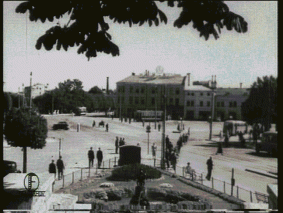
Tallin enne ja nuud
Tallin Here and NowEstonia 1939 8'
Directed by: Konstantin Marska
An old newsreel recounts, in a poetic-propagandistic style, the history of progress in Tallinn, the capital of Estonia. The film focuses on the parallels of the streets of the old ghetto in Tallinn and the modern streets after urban redevelopment. -
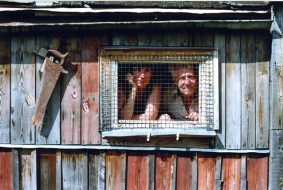
Tarps
The WormLatvia 1979 71'
Directed by: Andis Miziss
After the collapse of socialism, Karlis and Inese find themselves at the bottom of the social ladder. They dwell in an illegally built garden shed on the outskirts of the city and survive on one pension and other people's charity. After fifteen years of living together, Karlis and Inese are expecting their first baby. But once again, life proves not be very kind to them. An agonizing, documentary drama. -
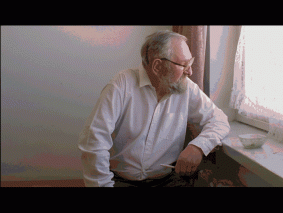
Tas, kurio nėra
CountdownLithuania 2004 45'
Directed by: Audrius Stonys
Portrait of Augustinas Baltrušaitis, film and theatre director, as well as actor, who fell into obscurity and has now been relegated to the margins of society, as a result of specific political circumstances. Countdown is a film about the limits of memory, the effects of the implacable passage of time, and a hope that surpasses time. -
Teodors
TheodoreLatvia 2006 29'
Directed by: Laila Pakalnina
In the Latvian countryside lives a lonely, elderly man. Every day, rain or shine, he takes his bicycle, riding the 7 kilometers that separate his house from the village in order to sit down at the village stop. When evening comes, he gets back on his bicycle and returns home. In a token account, Pakalnina describes the images of a country and a by-gone era, arriving somewhere between melancholy and humor. -
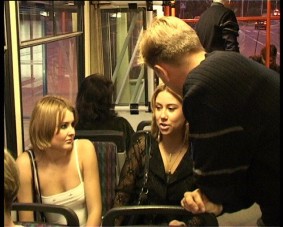
Troleibusų miestas
Trolley’s TownLithuania 2002 27'
Directed by: Giedre Beinoriute
An ironic documentary tells the story of public transport inspectors. Every day, whenever they find someone without a ticket, they are greeted by the same complains and arguments that drag on for a few minutes. A realist and in depth portrayal of social and existential problems of men and women who are accustomed to their everyday lives. -
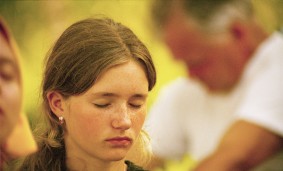
Ūkų ūkai
Uku UkaiLithuania 2006 30'
Directed by: Audrius Stonys
Uku Ukai is not a film that tells, but lives, like a meditation on time and space, on land and movement. Uku Ukai does not ask its audience to understand, but to enter in synthesis with the images and sounds. Uku Ukai is gymnastics for the spirit: bodies running, panting, turning without needing to reach anything. Images flick by, sounds reverberate, but the audience is the real film -
_thumb.jpg)
Uostas
HarbourLithuania 1998 10'
Directed by: Audrius Stonys
A thermal cure spa reveals strange ancestral rites. People who frequent it voluntarily submit to a kind of torture: jumping into mud, steam baths, freezing waters. “During the filming of Flying Over the Blue Fields, we lived in a spa. I watched the procedures and they astonished me: people were walking around naked like newborns, showing no sign of social distinction.” (A.S) -
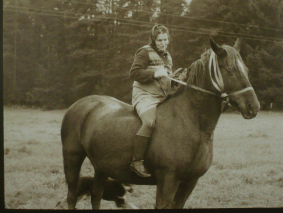
Už Slenksčio
Behind The ThresholdLithuania 1995 27'
Directed by: Diana Matuzevičienė, Kornelijus Matuzevičius
Damutė Gaižauskienė tolls bells for a living. It is a physically demanding job, but it is also meditative. The film seems to recover the fine thread of fate: Siberia is distant in time and space, but everything begins from that inhospitable land, where Damutė was deported and to where he has succeeded in returning, carrying behind him the disquiet of deportation and the pain of his experience. -
Vai viegli but jaunam
Is It Easy to Be Young?Latvia 1986 82'
Directed by: Juris Podnieks
The film begins with a news report: while returning home from an excursion, a group of young people damage public property. The trial that follows becomes an opportunity for an inquest into this new generation and all the problems that it faces. These problems are not longer affiliated with poverty. To the contrary, they are associated with the wealth of possibilities available and everything that modern society has to offer. In the end the ever-present question resurfaces, which is always without an answer: “Will younger and older generations ever understand each other?” -
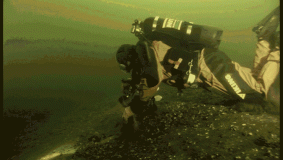
Varpas
The BellLithuania 2007 56'
Directed by: Audrius Stonys
Centuries ago a bell sunk to the bottom of the most crystalline lake in Lithuania. Over the years, legends about it spread, many of which tell how the bell became submerged. Now a scientific expedition is trying to dredge it out of the lake. But the bell might only be the stuff of old legend, the distant echo of a lost world. -
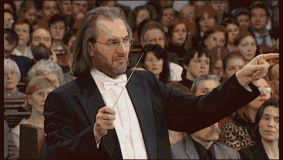
Vastutuulesaal
Headwind HallEstonia 2007 54'
Famous Estonian orchestra director Tõnu Kaljuste wants to build an Opera House called Nargen Opera on the island of Naissaar, a place that was a Soviet military base not long ago. The island has no regular ferry schedule, no electricity, and only one permanent resident. Against all odds, including the opposition of the financial world, Kaljuste wants to institute a cultural center which would serve as a meeting place of modernity and tradition. Along the way, he faces unexpected difficulties and becomes embroiled in absurd situations. -
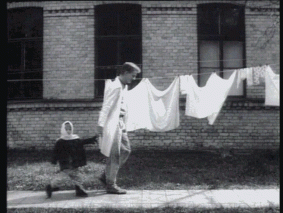
Veļa
The LinenLatvia 1991 10'
Directed by: Laila Pakalnina
Every day a man delivers laundry to a children’s hospital and faces life and death. Can life and death be every day? “I wanted to make a film about life, to do this I had to show the death: that is why we visited a children’s hospital” (L. P.) -
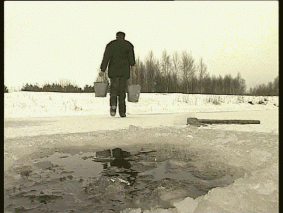
Venecijaus yvenimas ir cezario mirtis
Venecijus' Life and the Death of CezarLithuania 2002 55'
Directed by: Janina Lapinskaite
Venecijaus, a man in his late forties, has been left by his wife. He must face a new living situation that, for many months, he shares with the silent and sweet pig, Caesar. Venecijus does everything possible to retain his faith in the motto: don’t hang yourself today, if you can do it tomorrow. Maybe tomorrow won’t do for it all. -
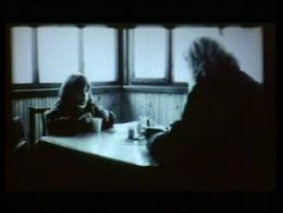
Viena
AloneLithuania 2001 35'
Directed by: Audrius Stonys
A sad child is going to pay a visit to her mother in prison. Her solitude is immense. Sitting in the backseat, she looks on in silence outside the window while the landscape passes in front of her eyes. The close up of this silent child is enough to fill the scene with feeling, expectance and timidity -
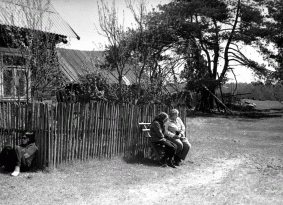
Žiniuonė
A SorceressLithuania 1975 10'
Directed by: Henrikas Šablevičius
Portrait of Eugenija Simkunaite, a graduate in biology who, in the ’50s and ’60s, visited many villages to study the secrets of traditional medicine. Intrigued by the way in which scientific thought and the attitudes of the natural world can co-exist in a person, the director presents her as a witchdoctor capable of ancient magic and surprising charms.

